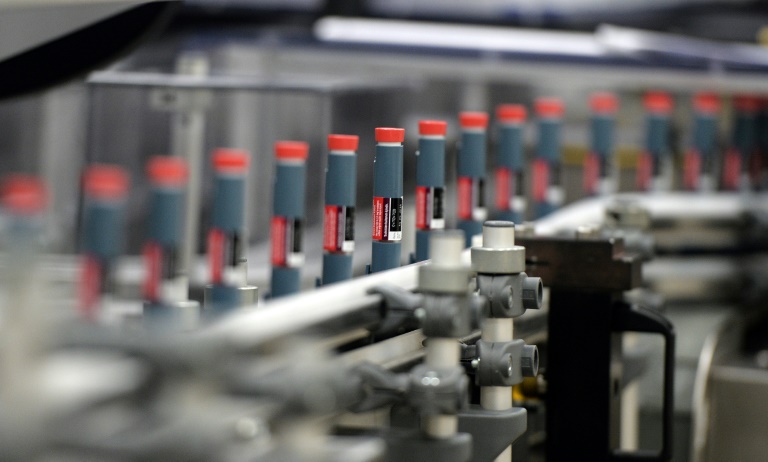Early blood glucose control for people with type 2 diabetes

US drugmaker Eli Lilly is cutting its costs for insulin, a move that could help combat the surge in health care costs for Americans including the millions who need insulin to treat their diabetes – Copyright AFP/File STR
A 20-year trial, beginning in 1977 (UK Prospective Diabetes Study or UKPDS)), led to worldwide changes in guidelines for blood glucose control. In 1977 the UKPDS randomly allocated people with newly diagnosed type 2 diabetes to an intensive blood glucose control strategy with sulfonylureas, insulin, or metformin, or to a conventional blood glucose control strategy, primarily with diet.
Now, new results assessed 24 years after the original trial ended, have found that early blood glucose control with insulin injections or sulfonylurea tablets led to 10 percent fewer deaths, 17 percent fewer heart attacks and 26 percent fewer diabetic complications.
In other words, the new results show that the legacy effects of implementing intensive blood glucose control straight after diagnosis of diabetes continue to persist for up to 24 years after the trial ended.
The researchers think that the new results strengthen the case for identifying people with type 2 diabetes at the earliest opportunity.
Following up UKPDS participants for up to 42 years was possible only with NHS data sources drawn from across the UK nations. This meant the researchers could study the effects of treatments given in midlife on diseases of ageing, such as dementia.
The research was led by scientists from the Universities of Oxford and Edinburgh and it finds that early good blood glucose control can minimise the lifetime risk of diabetes-related complications, including heart attacks, kidney failure and vision loss.
The data drawn from UKPDS represents the largest clinical evidence relating to diabetes yet assembled. This was one of the longest ever clinical trials in type 2 diabetes. The continuing data analysis was made feasible by incorporating ongoing UK National Health Service (NHS) data.
Professor Rury Holman, the founding Director of the University of Oxford Diabetes Trials Unit and Chief Investigator of the UKPDS, states: “These remarkable findings emphasise the critical importance of detecting and treating type 2 diabetes intensively at the earliest possible opportunity.”
Holman adds: “People may have type 2 diabetes for several years before being diagnosed as they may have few symptoms until their blood sugars become substantially elevated.”
The 24-year post-trial follow-up of the UK Prospective Diabetes Study is presented at the 67th Japan Diabetes Society meeting, Tokyo, Japan and published in the medical journal, The Lancet, titled “Post-trial monitoring of a randomised controlled trial of intensive glycaemic control in type 2 diabetes extended from 10 years to 24 years (UKPDS 91).”
Early blood glucose control for people with type 2 diabetes
#Early #blood #glucose #control #people #type #diabetes





